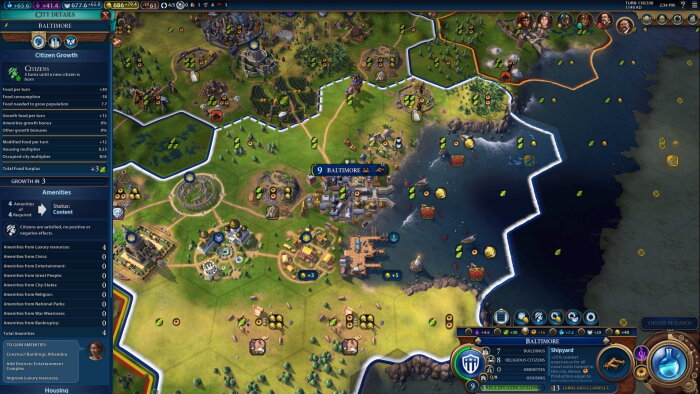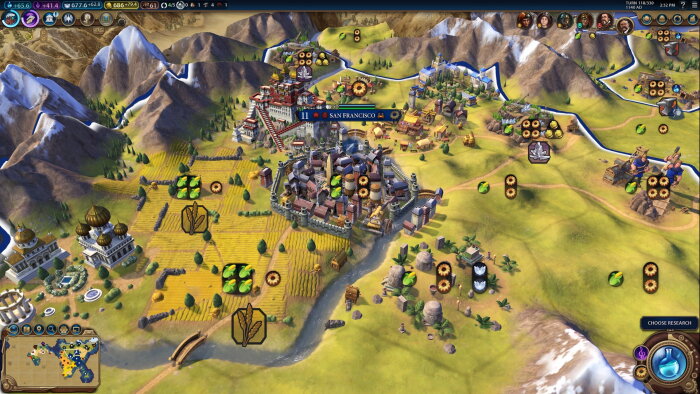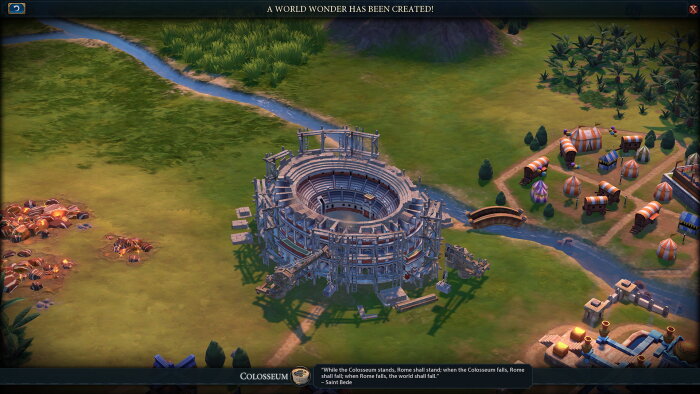Sid Meier’s Civilization® VI Game Details
Title: Sid Meier’s Civilization® VI
Genre: Strategy
Developer: Firaxis Games, Aspyr (Mac), Aspyr (Linux)
Publisher: 2K, Aspyr (Mac), Aspyr (Linux)
Release Date: 20 October 2016
Store: Steam
Game Releasers: P2P
About Sid Meier’s Civilization® VI Game
**Expand your empire, research technologies, and outmaneuver historical leaders in Sid Meier's Civilization VI, a strategy game where your civilization strives to stand the test of time.**

Sid Meier's Civilization VI is a turn-based strategy game that invites players to embark on an epic journey through the ages, guiding their chosen civilization from its humble beginnings to a dominant global power. As a virtual ruler, players wield immense power and responsibility, shaping the destiny of their people and leaving an indelible mark on the course of history. The game presents a captivating blend of city-building, technological advancement, cultural development, diplomatic maneuvering, and warfare, offering a rich and immersive experience that keeps players engaged for countless hours.
At the heart of Civilization VI lies the concept of empire building. Players begin with a single settler unit, tasked with establishing their first city. This city serves as the foundation of their civilization, the epicenter of their economic, scientific, and cultural activities. From this humble starting point, players must strategically expand their domain, founding new cities in resource-rich areas, developing their infrastructure, and nurturing their population. Each city becomes a unique hub, contributing to the overall growth and prosperity of the civilization.
One of the most distinctive features of Civilization VI is its district system. Unlike previous iterations of the series, where city improvements were placed directly within the city center, Civilization VI introduces districts as specialized zones that are built on the surrounding terrain. These districts serve as dedicated areas for specific activities, such as science, culture, commerce, and military training. By carefully selecting the location and specialization of their districts, players can optimize their city's production and unlock powerful bonuses.

For instance, a science district placed near mountains or rainforests can benefit from adjacency bonuses, boosting its research output. Similarly, a commercial hub located near rivers or coastlines can generate more trade revenue. The district system adds a layer of strategic depth to city planning, forcing players to consider the terrain and available resources when deciding where to build their districts. This system encourages players to think critically about their city layouts and adapt their strategies to the unique characteristics of each location.
Beyond city building, technological advancement is crucial for propelling a civilization forward. Civilization VI features a vast technology tree, filled with innovations that unlock new units, buildings, and abilities. Players must invest in scientific research to progress through the technology tree, unlocking new possibilities for their civilization. The technology tree is not a linear path; players can choose to focus on specific areas of research that align with their strategic goals.
For example, a player aiming for a military victory might prioritize research into advanced military technologies, such as gunpowder and tanks. On the other hand, a player pursuing a cultural victory might focus on technologies that unlock wonders of the world and boost cultural output. The technology tree provides players with a wide range of options, allowing them to tailor their research to their chosen path to victory.

Cultural development is equally important in Civilization VI. Culture represents the values, traditions, and artistic achievements of a civilization. By generating culture, players can progress through the civics tree, unlocking new government types, policies, and social reforms. The civics tree allows players to shape the political and social landscape of their civilization, adopting policies that suit their strategic goals.
For instance, a player focusing on economic growth might adopt policies that boost trade and production. A player seeking a cultural victory might embrace policies that promote tourism and artistic expression. The civics tree provides a dynamic and flexible system for shaping the identity and direction of a civilization. As a civilization progresses through the civics tree, it unlocks new government types, ranging from autocracy to democracy. Each government type offers unique bonuses and advantages, influencing the way a civilization is governed.
Diplomacy plays a significant role in Civilization VI. Players must interact with other civilizations, forging alliances, negotiating trade agreements, and managing their relationships with city-states. Each civilization in the game is led by a unique leader with distinct historical traits and agendas. These agendas influence the leader's behavior and interactions with other civilizations. Some leaders may be aggressive and expansionist, while others may be peaceful and focused on cultural development.

Understanding the agendas of other leaders is crucial for successful diplomacy. By catering to their desires and avoiding actions that offend them, players can build strong relationships and secure valuable alliances. Diplomacy can be a powerful tool for achieving victory, allowing players to peacefully expand their influence and secure access to resources. However, diplomacy can also be fraught with peril, as alliances can shift and betrayals can occur.
Warfare is an inevitable aspect of Civilization VI. When diplomacy fails, players must be prepared to defend their territory and conquer their enemies. The game features a diverse range of military units, from ancient warriors to modern tanks and aircraft. Strategic planning and tactical acumen are essential for success in battle. Players must consider the terrain, unit strengths and weaknesses, and the composition of their armies when engaging in warfare.
Terrain plays a crucial role in combat, providing defensive bonuses to units positioned on hills or in forests. Unit strengths and weaknesses determine their effectiveness against different types of enemies. For example, archers are effective against melee units but vulnerable to cavalry. The composition of an army is also important, as a balanced force with a mix of melee, ranged, and support units is more likely to succeed in battle. Warfare can be costly and disruptive, but it can also be a means of achieving significant gains, such as acquiring new territory or eliminating rival civilizations.

Civilization VI offers players a variety of paths to victory. The most common victory conditions include domination, science, culture, religion, and diplomacy. Domination victory requires players to conquer the capitals of all other civilizations. Science victory involves launching a successful mission to Mars. Culture victory requires players to attract more tourists than any other civilization. Religion victory requires players to convert the majority of the world's cities to their religion. Diplomacy victory involves earning the most diplomatic victory points through various means, such as forming alliances and completing world projects.
The diverse victory conditions allow players to choose a path that aligns with their strategic preferences. A player who enjoys military conquest can pursue a domination victory, while a player who prefers scientific advancement can aim for a science victory. The variety of victory conditions adds replayability to the game, as players can experiment with different strategies and civilizations to achieve different types of victory.
Sid Meier's Civilization VI is a complex and engaging game that offers a rewarding experience for strategy enthusiasts. With its intricate city-building mechanics, dynamic technology and civics trees, nuanced diplomacy, and challenging warfare, the game provides endless opportunities for players to shape the destiny of their civilization and leave their mark on the world. The game's replayability is enhanced by the diverse civilizations, each with its unique strengths and weaknesses, and the multiple paths to victory. Whether you prefer to conquer the world through military might, spread your culture through artistic expression, or achieve scientific supremacy through technological innovation, Civilization VI offers a captivating and immersive experience that will keep you coming back for more.
Sid Meier’s Civilization® VI Key Features
- * Forge your empire across a dynamic world, with cities that sprawl and expand like never before!
- * Unleash your inner strategist! Customize your cities with unique districts and powerful bonuses to dominate the map!
- * Beeline through history and unlock civilization-defining bonuses before your rivals even know what hit them!
- * Master the art of diplomacy, from savage first encounters to cunning alliances and backstabbing espionage!
- * Outmaneuver historical leaders with their own agendas, and prove your civilization will reign supreme!
Sid Meier’s Civilization® VI Gameplay
Download Links for Sid Meier’s Civilization® VI
Download Sid.Meiers.Civilization.VI.v101268.OnLine
Koramaup [4GB]
Part 1 - Part 2 - Part 3 - Part 4 - Part 5
1cloudfile [4GB]
Part 1 - Part 2 - Part 3 - Part 4 - Part 5
Bowfile [4GB]
Part 1 - Part 2 - Part 3 - Part 4 - Part 5
1fichier [4GB]
Part 1 - Part 2 - Part 3 - Part 4 - Part 5
Gofile [4GB]
Part 1 - Part 2 - Part 3 - Part 4 - Part 5
System Requirements for Sid Meier’s Civilization® VI
To enjoy Sid Meier's Civilization VI, your system should meet these specifications: For minimum requirements, you'll need a 64-bit version of Windows 7, 8.1, or 10, an Intel Core i3 2.5 GHz or AMD Phenom II 2.6 GHz processor (or better), 4 GB of RAM, a graphics card with 1 GB of memory, equivalent to an AMD 5570, nVidia 450, or Intel Integrated Graphics 530, DirectX Version 11, 17 GB of available storage space, and a DirectX compatible sound card. Note that initial installation requires a one-time internet connection for Steam authentication, along with the installation of Steam Client, Microsoft Visual C++ 2012 and 2015 Runtime Libraries, and Microsoft DirectX. An internet connection and Steam Subscriber Agreement acceptance are also necessary for activation. For a smoother experience, the recommended specifications include a 64-bit version of Windows 7, 8.1, or 10, a Fourth Generation Intel Core i5 2.5 GHz or AMD FX8350 4.0 GHz processor (or better), 8 GB of RAM, a graphics card with 2 GB of memory equivalent to an AMD 7970 or nVidia 770 (or better), DirectX Version 11, 23 GB of available storage space, and a DirectX compatible sound card.
Minimum:- OS *: Windows 7x64 / Windows 8.1x64 / Windows 10x64
- Processor: Intel Core i3 2.5 Ghz or AMD Phenom II 2.6 Ghz or greater
- Memory: 4 GB RAM
- Graphics: 1 GB & AMD 5570 or nVidia 450 or Intel Integrated Graphics 530
- DirectX: Version 11
- Storage: 17 GB available space
- Sound Card: DirectX Compatible Sound Device
- Additional Notes: Initial installation requires one-time Internet connection for Steam authentication; software installations required (included with the game) include Steam Client, Microsoft Visual C++ 2012 and 2015 Runtime Libraries, and Microsoft DirectX. Internet connection and acceptance of Steam™ Subscriber Agreement required for activation. See for details.
- OS *: Windows 7x64 / Windows 8.1x64 / Windows 10x64
- Processor: Fourth Generation Intel Core i5 2.5 Ghz or AMD FX8350 4.0 Ghz or greater
- Memory: 8 GB RAM
- Graphics: 2GB & AMD 7970 or nVidia 770 or greater
- DirectX: Version 11
- Storage: 23 GB available space
- Sound Card: DirectX Compatible Sound Device
How to Download Sid Meier’s Civilization® VI PC Game
1. Extract Release
2. Launch The Game
3. Play!

























